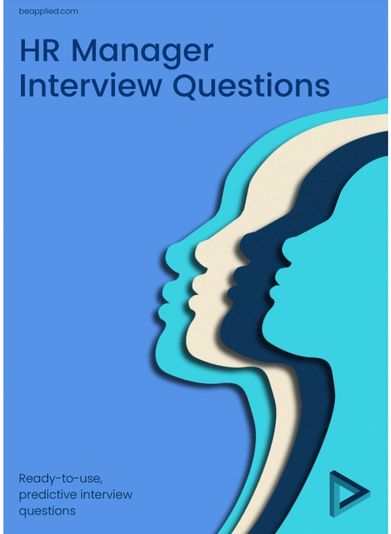HR Manager Interview Questions

About the role
These HR Manager interview questions have been designed to help you accurately identify the best possible candidate for your organisation.
HR Managers are responsible for planning and directing the administrative functions of an organisation. An HR Manager will tend to consult with executives on strategic planning, acting as a link between management and employees. Depending on the size and structure of the organisation, they may also be in charge of overseeing recruiting, interviewing and hiring of new employees.
HR manager responsibilities
- Hiring new employees
- Onboarding new employees
- Helping to resolve any workplace conflicts
- Developing HR strategies that are aligned with the organisation’s mission and goals
- Overseeing compensation and benefits
- Maintaining employee and workplace privacy
What skills should you be looking for?
You have identified a problem in a current HR process within the organisation. You have limited experience in this area but are keen to resolve the issue, how would you go about improving the process with your current capabilities?
It is the last hour of your working day before the weekend and the tasks below are still on your to-do list:
- Post a job advert on our recruitment system (the manager has provided the content)
- Prepare four contract variation letters (the effective dates are Monday)
- Right to Work check for a new employee joining the organisation on Monday
- Several queries from different employees about annual leave balances appear to be inaccurate in the system
- A colleague has emailed to say they would like to have a chat with HR (giving no details)
- Contact three shortlisted job applicants to invite them to interview on Wednesday next week
Please describe the approach you would take to managing these competing priorities. Which one or two would you choose to address immediately and why?
You have been put in charge of implementing a new environmentally friendly initiative which promotes having a paperless office. Senior management fully supports the initiative as they believe that it will lead to increased efficiency. However, the wider organisation has expressed some reluctance to this change taking place. How would you ensure that the initiative is implemented effectively?
A new change has been announced in relation to employment law. Explain how you will ensure you will know this and what your likely next actions will be.
A new employee will be joining the company next week. What things would you need to inform them of and check are in place before their arrival to ensure a smooth onboarding process?
What are structured interview questions?
Structured questions (or work samples) are highly predictive, job-specific questions designed to simulate parts of a job.
Structured work sample questions are the most predictive form of assessment you can use. Why? Because they directly test for skills by asking candidates to think as if they were already in the job.
Diversity
Testing for skills instead of just experience makes interviews a more inclusive process. 60%+ of candidates hired through our process would've been missed using CVs/traditional interviews - most of whom are from underrepresented groups.
Accuracy
By simulating tasks that would realistically occur in the role, you can see how candidates would think and work should they get the job.What could be more predictive than having candidates do small parts of the job before actually getting it?
Candidate experience
Candidates genuinely enjoy being given a chance to showcase their ability - this is why we have a 9/10 average candidate experience rating (including unsuccessful candidates).

Decide on the skills you’re looking for
Choose 6-8 core skills required for success in the role. These can be a mix of hard, technical skills as well as soft skills and general working characteristics.You could also include one or two of your organisation's most relevant values.
Think of scenarios that would test these skills
Next, come up with either everyday tasks or rarer, more challenging scenarios that would test some of these skills. They can be day-to-day duties, bigger projects or specific dilemmas that a candidate may realistically face. Should they get the job.
Pose scenarios hypothetically to create your questions
Instead of your typical ‘tell me a time when’ questions, ask candidates what they would do if faced with a given scenario.It's not that experience doesn't have any value… it's just more predictive to test directly for skills, without making assumptions based on background.
Give yourself scoring criteria
Want to make more data-driven hiring decisions? Score candidates against set criteria.We’d recommend starting out with a simple 1-5 star scale and a few bullet points noting what a good, mediocre and bad answer might include.

Use review panels
Having team members join your interviews will result in fairer, more accurate scores.Three is the magic number - you’ll start seeing diminishing return after that

.svg)